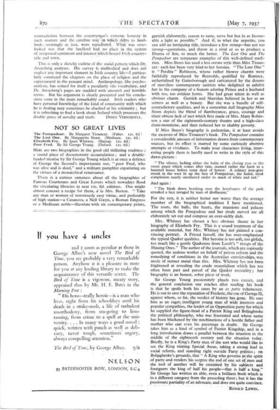NOT SO GREAT LIVES
The Pompadour. By Margaret Trouncer. (Faber. 12s. 6d.) The Lost One. By Marguerite Steen. (Methuen. I2S. 6d.) Elizabeth Fry. By Janet Whitney. (Harrap. 12S. 6d.) Poor Fred. By Sir George Young. (Oxford. 12S. 6d.) HERE are two biographies in the good old titillating tradition ; a sound piece of documentary accumulation ; and a double-
headed treatise by Sir George Young which is at once a defence of George the Second's importunate son, "poor Fred, who was alive and is dead," and a militant pamphlet expatiating on the virtues of a monarchical renaissance.
There is a curious sameness about all the biographies of Famous Courtesans and Great Lovers which nowadays flood
the circulating libraries in neat 12s. 6d. editions. One might almost concoct a recipe for them, ala Mrs. Beeton. "Take
any man or woman of notoriously easy virtue, and preferably of high station—a Casanova, a Nell Gwyn, a Roman Empress or a Medicean noble—illustrate with six contemporary prints, garnish elaborately, season to taste, serve hot but in as favour- able a light as possible." And if, to whet the appetite, you can add an intriguing title, introduce a few strong—but not too
strong—quotations, and throw in a rival or so to produce a Drama of Sex, so much the better. The Lost Oile and The Pompadour are temperate examples of this Well-defined tradi- tion. Miss Steen has used a less ornate style than Miss Troun- cer : each has been very kind to her heroine. "The Lost One" is " Perdita " Robinson, whose rather blowsy charms were faithfully reproduced by Reynolds, qualified by Romney,
aetherialised by Gainsborough and caricatured by the dozens of merciless contemporary satirists who delighted to exhibit her in the company of a buxom adoring Prince and a -htisband With too, too evident horns. She had great talent is well as obvious charm. Garrick and Sheridan believed in her as an actress as well as a beauty. But she was a bundle of self- contradictory qualities, and in a somewhat dull biography Miss Steen depicts the blend of flamboyance, grace, courage and sheer obtuse lack of tact which first made of Mrs. Mary Robin- son a star of the eighteenth-century theatre and a high-class demi-mondaine, and then reduced her to shabby poverty.
If Miss Steen's biography is pedestrian, it at least avoids the excesses of Miss Trouncer's book. The Pompadour contains
a considerable amount of information drawn from contemporary sources, but its effect is marred by some curiously abortive attempts at vividness. To make your characters living, inter- esting people there is hardly need to write in the style of this dawn-picture :
"The silence, lacking either the balm of the closing year or the sweet peace which comes after rain, seemed rather the hush in a haunted house before some deed of horror. A solitary iron-grey streak in the west lit up the face of Pompadour, the faded, tired complexion nearly smothered under its mask of white and red."
And again : "The bleak dawn breaking over the hornbeams of the park streaked a face ravaged by tears of disillusion."
For the rest, it is neither better nor worse than the average member of the biographical tradition I have mentioned.
The routs, the balls, the hunts, the mansions and palaces among which the Pompadour and her rivals moved are all elaborately set out and compose an over-sickly dish.
Mrs. Whitney has chosen a less obvious theme in her
biography of Elizabeth Fry. This is a sound treatment of the available material, but Mrs. -Whitney has not tiainted a con-
vincing portrait. A Friend herself, she has Over-emphasised the typical Quaker qualities. Her heroine is too soft, too girlish, too much like a gentle Quakeress from Lamb's" troops of the Shining Ones." The author of the journals; which are copiously quoted, the zealous worker on behalf of prison reform and the remedying of conditions in the Australian convict-ships, was made of sterner metal than this. Mrs. Whitney has not been frightened at revealing the crude materialism which has too often been part and parcel of the Quaker mentality ; her biography is an honest, sober piece Of work.
Sir George Young passionately pleads two causes, and the general conclusion one reaches after reading his book is that he spoils both his cases by an ex pane vehemence.
He is out to save the reputation of Frederic, the son o( George against whom, so far, the verdict of history has gone.. He sees him as an eager, intelligent young man of wide interests and popular sympathies, the leader of an Oppbsition party for which he supplied the figure-head of a Patriot King and Bolingbroke
the political philosophy, who was frustrated and whcise name has been blackened by the machinations Of a hostile- father and mother who- east even his parentage in doubt. Sir George takes him as a kind of symbol of Patriot Kingship, and in a long introduction draws a parallel between the situation in the middle of the eighteenth century and the situation today.
-Briefly, he is a King's Party man of the sort who would like to see the King visiting Special Areas, taking a strong lead in social reform, and standing right outside Party politics ; on BolinghrOke's grounds, that "A King who governs in the spirit
of party and renders his sceptre the rod ofone set 4. men and the tool of another will be esteemed by his subjects and foreigners the king of half his people—that is half a king"
Sir George has written an able, even a brilliant book which is in a different category from the preceding three; but it has the passionate partiality of an advocate, and does not quite convince.
LEwnc.














































 Previous page
Previous page